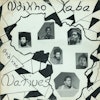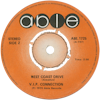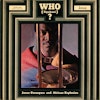This is spiritual jazz at its best. Ndikho lightly touches a few keys, and the piano becomes a path through the bush where city lights illuminate the alleys on either side of him. A stumbling, brush-heavy percussion and a swirl of saxophone notes are echoes of a faraway life. The disorientation at the start of the first track, “Shwabada,” leads to relief as the musicians find their groove. And relief leads to the second cut, “Freedom,” the only vocal track on the record.
Ndikho Xaba was born in 1934, in Natal, South Africa, and went into self-imposed exile in 1962. He landed in Oakland, California, where, in the late ’60s, he formed the Natives. While he was the only native of the motherland, like-minded brothers congregated around his strong musicality and philosophy of Ujamaa, the concept of African socialism—who a person becomes is determined by the relationship to their “extended family,” the whole community. Ndikho’s community would come to include a couple of members of the popular NYC R&B group, the Soul Syndicate: Kent “Shabalala” Parker from Brooklyn, and a Richmond, Virginia, native by the name of J. Plunky Branch. These two would shortly go on to form the Oneness of Juju, along with Natives’ vibraphonist, Lon Moshe (Ron Martin).
The group comes together at the start of side two with a song cowritten by Ndikho and his wife, Nomusa. The track is named for her, but the easy flow of the band on this track really showcases the collective experience. It’s a perfect statement of transcendent unity.
The album ends with the frenetic “Makhosi.” The music seems to have grabbed a hold of the band, and to let them go would be its own death, so it opts to fade out. There is the sense that even after the players have left the room, the sound keeps pulsating through the air like a body part that has fallen asleep and is slowly, perhaps painfully, coming back to life. But the pain is a memory, and the joy and celebration of life will always come to the forefront.


